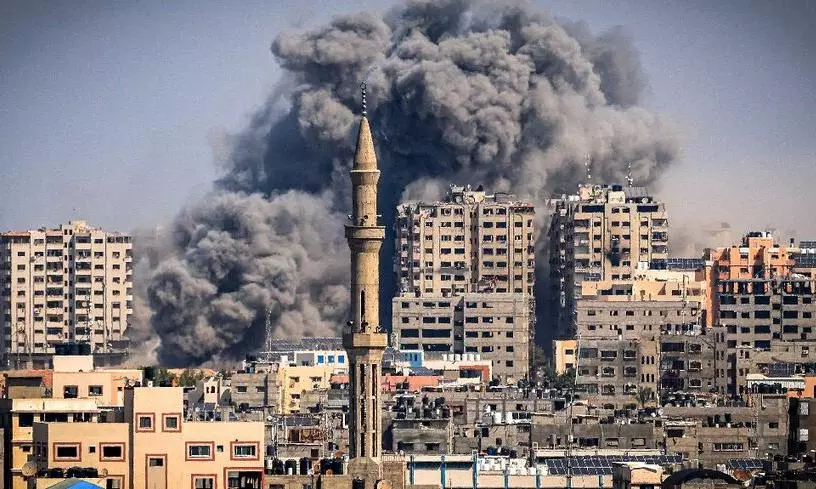
- Home
- India
- World
- Premium
- THE FEDERAL SPECIAL
- Analysis
- States
- Perspective
- Videos
- Sports
- Education
- Entertainment
- Elections
- Features
- Health
- Business
- Series
- In memoriam: Sheikh Mujibur Rahman
- Bishnoi's Men
- NEET TANGLE
- Economy Series
- Earth Day
- Kashmir’s Frozen Turbulence
- India@75
- The legend of Ramjanmabhoomi
- Liberalisation@30
- How to tame a dragon
- Celebrating biodiversity
- Farm Matters
- 50 days of solitude
- Bringing Migrants Home
- Budget 2020
- Jharkhand Votes
- The Federal Investigates
- The Federal Impact
- Vanishing Sand
- Gandhi @ 150
- Andhra Today
- Field report
- Operation Gulmarg
- Pandemic @1 Mn in India
- The Federal Year-End
- The Zero Year
- Science
- Brand studio
- Newsletter
- Elections 2024
- Events
- Home
- IndiaIndia
- World
- Analysis
- StatesStates
- PerspectivePerspective
- VideosVideos
- Sports
- Education
- Entertainment
- ElectionsElections
- Features
- Health
- BusinessBusiness
- Premium
- Loading...
Premium - Events

India stood diplomatically isolated like hardly ever before in South Asia, where both Islamic and non-Islamic neighbours united to vote for the UN resolution calling for an immediate truce
When the dust settles on Israel’s horrific war on Gaza, India will realise it has made three strategic blunders.
The most prominent howler was the government's decision to abstain on a UN resolution calling for an immediate truce amid Israel’s unending bombing that has reduced Gaza to a virtual rubble, killing nearly 10,000 people, mostly civilians, and injuring and maiming many more.
The justification for abstaining -- that the non-binding resolution did not denounce Hamas by name -- was at best spurious. Most countries that voted for the resolution have made clear their objection to Hamas’ savagery in southern Israel on October 7.
Even if India felt strongly that Hamas should have been named, it could have registered its opposition on that point, made it clear that Hamas is no better than a terrorist group, and still voted for the resolution whose primary aim was to convey to Israel where the majority of the world stood on the war.
Diplomatic isolation
After all, every country that voted for or against the resolution knew the resolution would have no effect on Israel, which is consumed by a vitriolic hatred that prevents it from drawing a line between Hamas and the mass of Palestinians who had no role in what the group unleashed.
Israeli government spokesman Eylon Levy gave the game away when he disclosed that Prime Minister Benjamin Netanyahu spoke telephonically to his Indian counterpart Narendra Modi before the October 27 vote. This is also the reason why Israel thanked India for standing by it – because that was indeed the message New Delhi wanted to convey and ended up conveying.
In the process, India stood diplomatically isolated like hardly ever before in South Asia, where both Islamic and non-Islamic neighbours united to vote for the resolution. This included Bhutan, which is no longer hesitant to make decisions on foreign policy and strategic issues independent of India.
The Indian representative to the UN’s support for “hostages” was a clear reference to those abducted by Hamas from Israel. The fact is that the Israeli military machine has transformed the entire population of Gaza into hostages, with no place they can call safe in Gaza.
Make no mistake. The Hamas onslaught on southern Israel was a war crime because its targets were overwhelmingly civilians, including women and even kids, and its decision to abduct men, women, children and even the elderly was as much a terrible crime as it was an act of cowardice.
No less than a war crime
But what Israel has unleashed with its undisputed superiority in weaponry is no less than a war crime. In the name of finishing off Hamas, Israel has rained death and destruction on a scale rarely seen in contemporary history. Until November 1, it carried out some 11,000 devastating air strikes that have left a quarter of all urban landscape in Gaza unlivable. And this was done after cutting off water and electricity to the overpopulated strip. Most of the dead and wounded are civilians.
It is this that an overwhelming majority of the countries want to end. After standing solidly by Israel all this while, the United States – the only major country to vote against the UN resolution -- too has begun calling for a pause to Israel’s offensive. When and if that happens, India will feel more isolated, and not just in South Asia.
Other countries with no sympathy for Hamas have acted differently. Prince Turki al-Faisal, a widely respected elder statesman in the Saudi royalty, condemned both Hamas and Israel though Riyadh was close to shaking hands with Tel Aviv before October 7 – and may well do so once the fighting abates. And while Singapore cannot be compared to India in size or population, both countries have roughly the same percentage of Muslims. Muslims account for over 14 per cent of India’s population and over 15 per cent in Singapore.
Singapore branded October 7 a terror attack by Hamas which it said cannot be justified. But while underscoring Israel’s right to self-defence, it made it clear that “self-defence cannot include indiscriminate killing of civilians”. India too could have voted for the UN resolution and denounced Hamas. New Delhi’s failure is not going to promote Indian interests in the vast Arab world besides derailing its claim for leadership of the developing world.
Anti-Hamas/Muslim propaganda
The second Indian blunder – even if it was not state-sponsored – was the steady proliferation of crudely produced anti-Hamas/Muslim propaganda that gripped social media in the immediate aftermath of October 7.
It became clear quickly that much of this disinformation was originating from India. Most Arab commentators drew a link between the propaganda and India’s ruling party. No one had forgotten the disastrous lampooning of the Prophet by a section of the BJP which triggered outrage in Arab and Islamic countries.
The Indian government’s decision not to permit any public solidarity with the suffering Palestinians at this critical juncture is the third blunder. This only confirms that the decision to abstain from the UN vote was more a subtle pro-Israel decision and not a middle-of-the-road path. This belief gets strengthened by permission granted to any number of pro-Israel rallies across the country, almost all of which have a link with Hindu right-wing groups.
Prime Minister Modi may have spoken to Palestinian Authority leader Mahmoud Abbas and reiterated the long-held Indian stand on a two-nation state. But all that has no value when India cannot speak out loudly against the slaughter of innocent Palestinians by Israel whose actions have frittered away all the sympathy it gained in the wake of Hamas’ dance of death on October 7.


